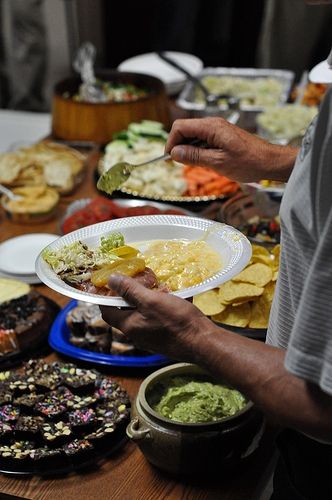Chicken salad recall put the spotlight on mysterious food pathogen, Listeria monocytogenes
The news this past week that nearly three tons of Trader Joe’s prepared barbeque chicken salad were recalled due to possible contamination by Listeria moncytogenes had me wondering anew about this mysterious foodborne pathogen. And today, seven tons of Garden Fresh prepared salads were also recalled.
I’ve spent precious minutes worrying about E. coli (ubiquitous, especially in poop) and Salmonella (the reason we must take care with raw eggs), but why doesn’t Listeria moncytogenes rank higher on my food-safety recognition meter?
A quick check of the U.S. Food and Drug Administration website showed that of 27 food recalls in July, 16 were related to Listeria monocytogenes. (One was linked to Staph bacteria, three to Salmonella and the rest to undeclared ingredients.)
Susan Algert, UC Cooperative Extension advisor in Santa Clara County, helped to fill me in. She is a nutrition, family and consumer sciences expert. Listeria monocytogenes is a ubiquitous soilborne bacteria found virtually everywhere.
The problem arises, Algert said, when the bacteria is spread by food handlers, farm equipment and food processing machines, then allowed to grow to levels that can cause illness.
“It can proliferate in the refrigerator if it’s not cold enough, under 40 °F,” Algert said, “and it will not be killed if food isn’t heated to over 140 °F.”
Safe food handling is key to preventing listeriosis, and all other foodborne illnesses, in people at greatest risk. This includes:
- Washing hands before preparing food.
- Thawing foods in the refrigerator — never at room temperature.
- Keeping foods cold (< 40 °F) or heating them thoroughly (> 140 °F).
- Disposing of perishable foods that have been left out for more than an hour.
“These measures are especially important at this time of year,” Algert said. “It’s warm. Dangerous bacteria in food will grow faster.”
(ANR has published guidelines for controlling Listeria monocytogenes in food packing operations.)
Algert noted that the symptoms of listeriosis can occur long after exposure, another reason why illnesses may not be linked to the bacteria.
“The incubation period is up to 70 days,” she said. “Many people get sick but don’t associate it with something they ate several weeks ago.”
While it was the chicken salad recall that hit the news, the recall actually involved all onions processed by Gill’s Onions of Oxnard, which supplies onions for processed salads and other foods. Other California products affected by the recall included Trader Joe’s salad dressings, butternut squash salad, and red quinoa and wheatberry salad. The Garden Fresh prepared salads also contained these onions.
The products were voluntarily recalled after FDA found Listeria monocytogenes in a random sample of diced yellow onions; the factory has been closed since July 17 pending an investigation. No illnesses have been linked to the possibly contaminated products.
“Gills Onions is committed to protecting public health and to executing this voluntary recall effectively and efficiently,” said Steve Gill, president of the company. “We are a multigenerational family business, and we work hard every day to earn the trust and confidence of customers and consumers who enjoy our high quality, healthy products.”
Anyone who has the recalled product should not consume it and destroy or discard it. Trader Joe’s said that it will provide full refunds.

